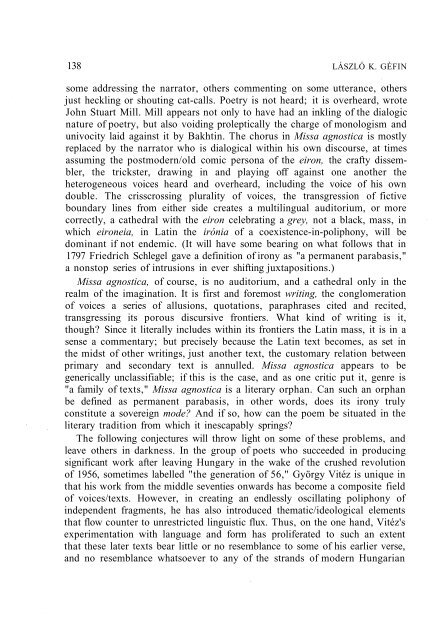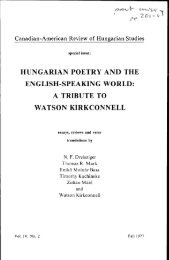138 LÁSZLÓ K. GÉFINsome addressing the narrator, others commenting on some utterance, othersjust heckling or shouting cat-calls. Poetry is not heard; it is overheard, wroteJohn Stuart Mill. Mill appears not only to have had an inkling of the dialogicnature of poetry, but also voiding proleptically the charge of monologism andunivocity laid against it by Bakhtin. The chorus in Missa agnostica is mostlyreplaced by the narrator who is dialogical within his own discourse, at timesassuming the postmodern/old comic persona of the eiron, the crafty dissembler,the trickster, drawing in and playing off against one another theheterogeneous voices heard and overheard, including the voice of his owndouble. The crisscrossing plurality of voices, the transgression of fictiveboundary lines from either side creates a multilingual auditorium, or morecorrectly, a cathedral with the eiron celebrating a grey, not a black, mass, inwhich eironeia, in Latin the irónia of a coexistence-in-poliphony, will bedominant if not endemic. (It will have some bearing on what follows that in1797 Friedrich Schlegel gave a definition of irony as "a permanent parabasis,"a nonstop series of intrusions in ever shifting juxtapositions.)Missa agnostica, of course, is no auditorium, and a cathedral only in therealm of the imagination. It is first and foremost writing, the conglomerationof voices a series of allusions, quotations, paraphrases cited and recited,transgressing its porous discursive frontiers. What kind of writing is it,though? Since it literally includes within its frontiers the Latin mass, it is in asense a commentary; but precisely because the Latin text becomes, as set inthe midst of other writings, just another text, the customary relation betweenprimary and secondary text is annulled. Missa agnostica appears to begenerically unclassifiable; if this is the case, and as one critic put it, genre is"a family of texts," Missa agnostica is a literary orphan. Can such an orphanbe defined as permanent parabasis, in other words, does its irony trulyconstitute a sovereign mode? And if so, how can the poem be situated in theliterary tradition from which it inescapably springs?The following conjectures will throw light on some of these problems, andleave others in darkness. In the group of poets who succeeded in producingsignificant work after leaving Hungary in the wake of the crushed revolutionof 1956, sometimes labelled "the generation of 56," György Vitéz is unique inthat his work from the middle seventies onwards has become a composite fieldof voices/texts. However, in creating an endlessly oscillating poliphony ofindependent fragments, he has also introduced thematic/ideological elementsthat flow counter to unrestricted linguistic flux. Thus, on the one hand, Vitéz'sexperimentation with language and form has proliferated to such an extentthat these later texts bear little or no resemblance to some of his earlier verse,and no resemblance whatsoever to any of the strands of modern Hungarian
THE AGON OF IRONY AND SATIRE 139poetry, be it that of Füst, Babits, Kassák, Attila József, Weöres, Pilinszky, orJuhász. In making word play, free association, and intertextual juxtapositionsthe main building blocks of his poems, Vitéz appears to have escaped not onlythe formal models of his precursors, but through the irony of his puns andallusions he has eliminated the moral earnestness and seriousness that has beenobligatory in Hungarian poetry since the romantic period. On the other hand,in becoming conscious of his distance from the tradition of seriousness thatstill today demands that the poet assume the role of national spokesman - toshow the way to the Promised Land, as Petőfi had prescribed - Vitéz's avantgardepieces are often made to serve as vehicles of scathing criticism directedboth at an outmoded poetic attitude and at the backwardness of the culturethat fosters it. Missa agnostica, written between 1974 and 1976, published asa single volume in 1979, exhibits all aspects of this duality in its being just sucha composite of random freeplay and a critique of Christianity in general as wellas a particular attack on the most sacrosanct and stubborn streak in Hungariancultural life, what the poem calls "the Christian Hungarian militarytheology" (18). 1Is Bakhtin right, then? Is ironic poliphony and dialogism in Missa agnosticaa front, as it were, for monologic control characteristic of all poetry? Doescritique ab ovo reduce freeplay to gravity? Or conversely, does linguisticfreeplay render criticism ineffective, especially in our literature where the comicmode has alway been sharply separated from the serious treatment of serioussubjects? It could be argued that the gadfly is, after all, a traditional personain Hungarian poetry, whose barrage of invective would only be weakened bylinguistic play; or, that behind the disjointed verbal surface of Vitéz's neodadaistpunning there lurks a conventional moralist whose diatribes soundvery much like those of his predecessors he is supposed to have discarded; thatfar from escaping his precursors, Vitéz's closest relative would be Ady (echoed,incidentally, a number of times in the Missa) who directed his attacks onnearly the same seats of mendacity, posturing, hypocrisy, ossified self-delusion,and Asian provincialism as did Vitéz, except that unlike Vitéz, Ady alwaysknew how and when to put a stop to his parabases; his invective had alwaysmanaged to unscramble and rechannel his ironies. Ady knew (no agnostic, he)the law of genre: the prophetic or vatic stance demands undiluted seriousness.Verbal play is acceptable only when the writer has dispensed with the intentionof saying something of importance or of saying anything at all. (When contenthas been given the day off - to cite Tibor Papp.)So would go conventional interpretive wisdom, not only that of LászlóNémeth - no negligible straw man even in today's Hungarian literary criticism- but also of Matthew Arnold, or even Horace and Aristotle. Would
- Page 1 and 2:
Papers of the Radnóti Memorial Con
- Page 3:
HUNGARIAN STUDIESVOLUME 11, 1996 CO
- Page 8 and 9:
6 GEORGE GÖMÖRIprobably Fürst an
- Page 10 and 11:
8 GEORGE GÖMÖRIof the utmost impo
- Page 12 and 13:
10 GEORGE GÖMÖRIén e földön...
- Page 14 and 15:
12 GEORGE GÖMÖRINotes1. Miklós R
- Page 16 and 17:
14 MIHÁLY SZEGEDY-MASZÁKself alwa
- Page 18 and 19:
16 MIHÁLY SZEGEDY-MASZÁKtype is r
- Page 20 and 21:
18 MIHÁLY SZEGEDY-MASZÁKpose, the
- Page 22 and 23:
20 MIHÁLY SZEGEDY-MASZÁK"Wozu Dic
- Page 24 and 25:
22 MIHÁLY SZEGEDY-MASZÁKand Wilme
- Page 26 and 27:
24 MIHÁLY SZEGEDY-MASZÁKbeen the
- Page 28 and 29:
26 MIHÁLY SZEGEDY-MASZÁKBolond, k
- Page 30 and 31:
28 MIHÁLY SZEGEDY-MASZÁK6. Emery
- Page 32 and 33:
30 ZSUZSANNA OZSVÁTHand breaks as
- Page 34 and 35:
32 ZSUZSANNA OZSVÁTHThe drama echo
- Page 36:
34 ZSUZSANNA OZSVÁTHcontinents at
- Page 39 and 40:
FROM CAIN TO NAHUM 37which, as Csap
- Page 41 and 42:
\FROM CAIN TO NAHUM 39and bears and
- Page 43 and 44:
FROM CAIN TO NAHUM 41who sees what
- Page 45 and 46:
FROM CAIN TO NAHUM 438. "A félelme
- Page 47 and 48:
HELP ME, PASTORAL MUSE:THE VIRGELIA
- Page 49 and 50:
HELP ME, PASTORAL MUSE 47compete! W
- Page 51 and 52:
HELP ME, PASTORAL MUSE 49of a priva
- Page 53 and 54:
HELP ME, PASTORAL MUSE 51Once again
- Page 55 and 56:
HELP ME, PASTORAL MUSE 53Eighth Ecl
- Page 57 and 58:
HELP ME, PASTORAL MUSE 55have that
- Page 59:
HELP ME, PASTORAL MUSE 57Paul de Ma
- Page 62 and 63:
60 SAMUEL J. WILSONWe did, however,
- Page 64 and 65:
62 SAMUEL J. WILSONbeings and contr
- Page 66 and 67:
64 SAMUEL J. WILSONHungarians would
- Page 68 and 69:
66 SAMUEL J. WILSONthe Austrians. G
- Page 70 and 71:
68 SAMUEL J. WILSONnorth-eastern Zi
- Page 72 and 73:
70 SAMUEL J. WILSONoriginally pursu
- Page 74 and 75:
72 SAMUEL J. WILSONGörgey's decisi
- Page 76 and 77:
74 SAMUEL J. WILSONfrom occurring,
- Page 78 and 79:
76 SAMUEL J. WILSON8. Artúr Görge
- Page 80 and 81:
78 STEVEN TÖTÖSY de ZEPETNEKtört
- Page 82 and 83:
80 STEVEN TÖTÖSY de ZEPETNEKThe c
- Page 84 and 85:
82 STEVEN TÖTÖSY de ZEPETNEKher u
- Page 86 and 87:
84 STEVEN TÖTÖSY de ZEPETNEKthe b
- Page 88 and 89:
86 STEVEN TÖTÖSY de ZEPETNEKrooti
- Page 90 and 91: 88 STEVEN TÖTÖSY de ZEPETNEKcriti
- Page 92 and 93: 90 STEVEN TÖTÖSY de ZEPETNEK'My f
- Page 94 and 95: 92 STEVEN TÖTÖSY de ZEPETNEKshe d
- Page 96 and 97: 94 STEVEN TÖTÖSY de ZEPETNEKNotes
- Page 99 and 100: BERLIN ET PARIS DE LAJOS TIHANYIVAL
- Page 101 and 102: BERLIN ET PARIS DE LAJOS TIHANYI 99
- Page 103 and 104: BERLIN ET PARIS DE LAJOS TIHANYI 10
- Page 105 and 106: BERLIN ET PARIS DE LAJOS TIHANYI 10
- Page 107 and 108: BERLIN ET PARIS DE LAJOS TIHANYI 10
- Page 109 and 110: BERLIN ET PARIS DE LAJOS TIHANYI 10
- Page 111 and 112: BERLIN ET PARIS DE LAJOS TIHANYI 10
- Page 113 and 114: BERLIN ET PARIS DE LAJOS TIHANYI 11
- Page 115: BERLIN ET PARIS DE LAJOS TIHANYI 11
- Page 118 and 119: 116 KEVIN E. KELLYfilms Lugosi made
- Page 120 and 121: 118 KEVIN E. KELLYthe provinces, no
- Page 122 and 123: 120 KEVIN E. KELLYWith his brief an
- Page 124 and 125: 122 KEVIN E. KELLYboth his and Dean
- Page 126 and 127: 124 KEVIN E. KELLYfollowed it into
- Page 128 and 129: 126 KEVIN E. KELLYvampiric nobleman
- Page 130 and 131: 128 KEVIN E. KELLYThe film also boo
- Page 132 and 133: 130 KEVIN E. KELLYWood remained one
- Page 134 and 135: 132 KEVIN E. KELLYLugosi, convinced
- Page 136 and 137: 134 KEVIN E. KELLY19. Lennig, 112-1
- Page 139: THE AGON OF IRONY AND SATIREIN GYÖ
- Page 143 and 144: THE AGON OF IRONY AND SATIRE 141tra
- Page 145 and 146: THE AGON OF IRONY AND SATIRE 143fek
- Page 147 and 148: THE AGON OF IRONY AND SATIRE 145ner
- Page 149 and 150: THE AGON OF IRONY AND SATIRE 147whi
- Page 151 and 152: THE AGON OF IRONY AND SATIRE 149mov
- Page 153 and 154: THE AGON OF IRONY AND SATIRE 151for
- Page 155 and 156: THE AGON OF IRONY AND SATIREA harma
- Page 157 and 158: MURDER IN THE MOUNTAINSTranslated b
- Page 159 and 160: MURDER IN THE MOUNTAINS 157"Afraid?
- Page 161 and 162: MURDER IN THE MOUNTAINS 159Abády,
- Page 163 and 164: MURDER IN THE MOUNTAINS 161"The mar
- Page 165 and 166: MURDER IN THE MOUNTAINS 163Bálint
- Page 167 and 168: MURDER IN THE MOUNTAINS 165"That is
- Page 169 and 170: MURDER IN THE MOUNTAINS 167at hand,
- Page 171 and 172: CONTRIBUTORSMiklós BÁNFFYLászló
















